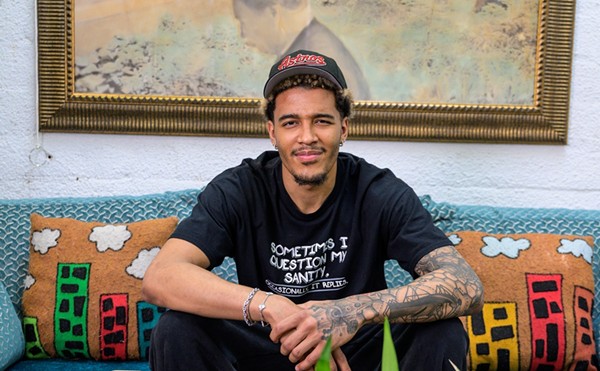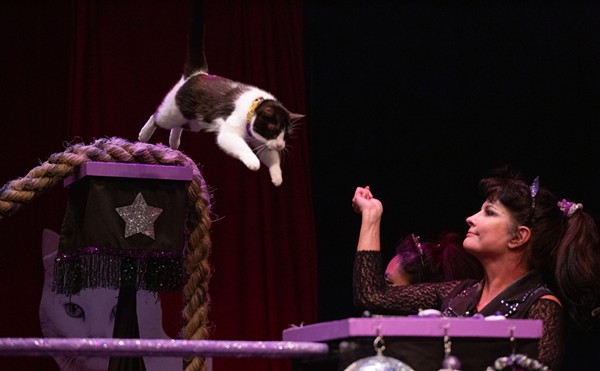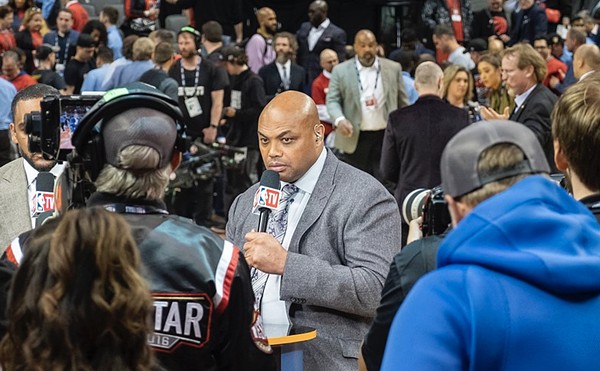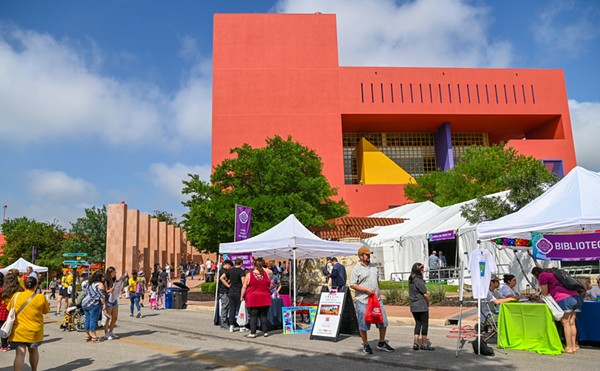The well-worn adage “It takes a village to raise a child” holds true when it comes to the illiteracy issue weighing on San Antonio. As the Current’s On the Books series has chronicled in past installments, arts and literature educations have been hamstrung in the public school system by a legacy of racism, funding disparities punishing low-income South Texas, and, more recently, all-demanding teach-to-the-test formulas. Arts educations were already being starved off long before lawmakers began talking about serious cuts to state education funding this session. Those noble nonprofits that so often have stepped into the gap to bring the fire of creativity into the system are, in turn, now being attacked by the Texas Legislature as it drains the Texas Commission on the Arts.
In the first On the Books installment we introduced the challenge: how can a poor city lacking in resources produce generations of empowered and literate residents (See “Is our children learning,” November 3, 2010)? In series two, we discussed how the educational system fails student writers, and how former educators are crying foul (See “Creativity at Ground Zero,” February 2, 2011). This week, we examine how individuals and non-profit organizations are working to provide students (and dropouts) with the opportunities they couldn’t find in a traditional schoolroom setting.
Thankfully, organizations and agencies like Gemini Ink, Literacy SA, San Antonio Commission on Literacy, San Antonio Education Partnership, and San Antonio Public Library Foundation are just a few groups that have stepped into the breach with a variety of services to combat illiteracy — roughly 15 percent city-wide — and provide educational resources for learners of all ages.
At last month’s SA2020 event, Mayor Julián Castro announced plans to use local sales tax funds to establish a Brainpower Initiative with USAA President and CEO Joe Robles, Jr. as chairman and H-E-B CEO Charles Butt as honorary chairman of the task force. (Expect to see the issue on your November election ballot.) Castro wants the group to study national trends and programs that are positively affecting education elsewhere, especially by focusing on early learning, college readiness, and dropout prevention. “The number one issue to tackle is the need to improve educational outcomes,” Castro said.
One proposed initiative that aims to improve the numbers is a new partnership between Literacy SA, San Antonio Youth Literacy (SAYL), and the Rotary District 5840. The goal is to expand the existing SAYL “Let’s Read” program by matching reading buddies with second graders in Bexar County who are identified by their teachers as needing extra help. Literacy SA works with over 30 local community service providers to improve San Antonio’s literacy levels. Since its inception in 2007 within the Junior League of San Antonio, the coalition has taken over the city-wide SA Reads Book Drive launched by state Senator Joaquin Castro. Last year they collected 60,000 books for local students.
“I want so badly for our community to work together on this issue. I really think that we can fix it,” Literacy SA’s Interim Executive Director Pamela Toman said. “Reading is something we know how to teach people to do. It’s not like curing cancer where we don’t necessarily have the solutions; we know how to do this. So what `we` have to do is work together to make sure that we do it for the health of the city.”
But not everyone holds to the failure-by-design theory of public ed that our series has accentuated, social services manager for the City’s Department of Community Intiatives, Veronica Ordaz Collazo, blames a lack of passion among teachers and lack of involvement of the community at large. “You can have all the resources in the world, but if the teacher is not inspired and doesn’t make it a fertile environment for learning, nothing’s going to happen,” she said. “We all need to participate and give input, and get involved by mentoring, by volunteering, by supporting organizations. We just need to be more involved.”
Marian Aitches, a senior history lecturer at the University of Texas at San Antonio, grew up in San Antonio’s Victoria Courts, one of the country’s oldest public housing projects, since demolished in 1999. But she doesn’t blame her poor upbringing for a less-than-stellar educational experience. In fact, she considers herself lucky to have been introduced to books by her mother and teachers. After graduating from the University of North Texas and teaching outside of the state, Aitches returned home 10 years ago to become involved in the literary-arts community, specifically with Gemini Ink. She credits one of Gemini Ink’s programs, Writers in Communities (WIC), which sends professional writers into diverse community settings to work alongside students of all ages in an effort to do what other educators might not be able to — inspire students. Writers go into the classroom setting for four to six weeks and introduce poetry and flash fiction to students, which allows them a glimpse another method of learning.
“`Writers in Communities` is really the most important work of Gemini Ink — having programs where kids from low-income schools get extra attention, and have a chance to have a voice, tell their stories, and be confident in themselves as readers and writers,” Aitches said. “That’s not an easy thing.”
Heather Kerns-James concurs. She reentered high school after dropping out and signed up to take a writing workshop as part of Gemini’s WIC program. “WIC has given me a voice that I didn’t realize I had, or even needed to have. It also gave me a newfound confidence in myself when I discovered that I was actually good at writing,” Kerns-James said. “All my life I had been holding onto art as a career lifeline. Now I see I have another choice.”
Since completing the workshop she’s preparing to enroll in college and major in creative writing.
GET INVOLVED
Project Learn to Read
950 Donaldson Ave, (210) 223-5687, projectlearntoread.org
Focused on teaching illiterate adults to read. Relies on volunteer tutors.
Gemini Ink
513 S Presa, (210) 734-9673, geminiink.org
The nonprofit literary arts org reaches out to young people at risk through its Writers in the Communities program.
San Antonio Education Partnership
206 San Pedro, Ste. 200, (210) 229-9900, saedpartnership.org
Works to make college possible for students through scholarships and assistance.
San Antonio Public Library Foundation
625 Shook Ave, (210) 225-4728, saplf.org
Ask about early literacy program Born To Read, the Scholastic Literacy Caravan, and tween initiatives like Youth Wired and the Summer Reading Club.
Big Brothers Big Sisters of South Texas
202 Baltimore Ave, (210) 225-6322, bigmentor.org
Matches volunteer mentors with Bexar County young people.
San Antonio Youth Literacy
700 N St. Mary’s, (210) 299-1533
Promoting literacy among SA’s at-risk youth. Needs tutors, office volunteers, and interns.
Related:
How a local poet found art (and the rosary) can heal and restore lives
When One Cultura isn't Enough: A Love Story
















